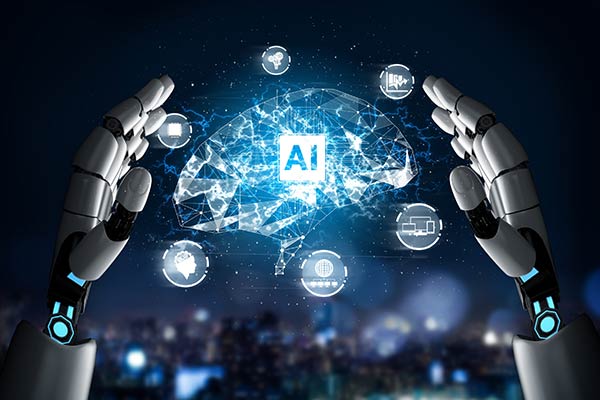Table of Contents
Introduction
AI has rapidly evolved, transforming various industries. Cloud computing, on the other hand, has become a cornerstone of modern IT infrastructure, offering scalable and flexible resources. The convergence of AI and cloud computing is ushering in a new era of innovation, promising unprecedented benefits but also raising legitimate concerns.
In this blog, we will delve into the advantages and challenges of integrating AI into cloud computing. We will explore how AI can enhance cloud security and address potential risks. By understanding the interplay between these two powerful technologies, we can harness their potential to drive progress and mitigate challenges.

Benefits of AI in Cloud Computing
Enhanced Scalability and Efficiency
- Dynamic resource allocation: AI algorithms can intelligently allocate resources based on real-time demand, ensuring optimal utilization.
- Predictive analytics: AI can forecast future workloads, enabling proactive resource provisioning and avoiding bottlenecks.
- Automation of tasks: AI-powered automation can streamline routine tasks, freeing up human resources for more strategic activities.
Improved Data Analysis and Insights
- Advanced analytics: AI can extract valuable insights from vast datasets, uncovering hidden patterns and trends.
- Machine learning: AI models can learn from data, improving their accuracy over time and enabling more precise predictions.
- Data-driven decision-making: AI-powered analytics can provide organizations with data-driven insights to make informed decisions.
Enhanced Application Development and Deployment
- Accelerated development: AI can automate various aspects of application development, reducing time-to-market.
- Intelligent automation: AI-powered tools can assist developers in tasks such as code generation and testing.
- Simplified deployment: AI can streamline the deployment process, ensuring consistency and reducing errors.
Cost Optimization
- Optimized resource utilization: AI can help identify and eliminate underutilized resources, reducing costs.
- Predictive cost management: AI can forecast future costs based on usage patterns, enabling organizations to plan and budget effectively.
- Reduced operational expenses: AI-powered automation can streamline operations and reduce the need for manual intervention.

Key Advantages and Challenges of Using Cloud Platforms for AI Projects
Advantages
- Scalability: Cloud platforms offer the flexibility to scale resources up or down as needed, accommodating fluctuating workloads.
- Cost-effectiveness: Cloud computing can be more cost-effective than on-premises solutions, especially for small and medium-sized businesses.
- Accessibility: Cloud platforms provide easy access to a wide range of AI tools and frameworks.
- Innovation: Cloud providers often invest heavily in AI research and development, offering cutting-edge technologies.
Challenges
- Data privacy and security: Storing sensitive data in the cloud raises concerns about data privacy and security breaches.
- Vendor lock-in: Relying heavily on cloud providers can create vendor lock-in, limiting flexibility and increasing costs.
- Network latency: In some cases, network latency can impact the performance of AI applications.
- Complexity: Managing complex cloud environments and AI workloads can be challenging for organizations with limited expertise.
The Role of AI in Cloud Security
Threat Detection and Prevention
- Anomaly detection: AI algorithms can identify unusual patterns in network traffic and system behavior, indicating potential security threats.
- Behavioral analytics: AI can analyze user behavior to detect unauthorized access or suspicious activities.
- Threat intelligence: AI can gather and analyze threat intelligence data to stay informed about emerging threats.

Security Incident Response
- Automated incident response: AI can automate routine tasks during security incidents, speeding up response times.
- Prioritization of threats: AI can help prioritize security incidents based on their severity and potential impact.
- Forensics analysis: AI can assist in forensic investigations, identifying the root cause of security breaches.
Compliance and Risk Management
- Compliance monitoring: AI can help organizations comply with various security regulations and standards.
- Risk assessment: AI can identify and assess potential security risks, enabling organizations to take proactive measures.
- Security posture management: AI can help organizations maintain a strong security posture by identifying and addressing vulnerabilities.
Conclusion
The convergence of AI and cloud computing is reshaping the landscape of technology. By leveraging the power of AI, organizations can unlock new opportunities, improve efficiency, and drive innovation. However, it is essential to address the challenges and concerns associated with this integration. By understanding the benefits and risks, organizations can make informed decisions and harness the full potential of AI in cloud computing.
What is AI in cloud computing?
AI in cloud computing refers to the integration of artificial intelligence technologies with cloud computing platforms. It combines the power of AI algorithms with the scalability, flexibility, and cost-effectiveness of cloud infrastructure.
What are the key benefits of using AI in cloud computing?
AI in cloud computing offers several benefits, including enhanced scalability, improved data analysis, accelerated application development, cost optimization, and enhanced security.
How does AI help in cloud security?
AI can significantly improve cloud security by detecting and preventing threats, responding to incidents more effectively, and ensuring compliance with security regulations.